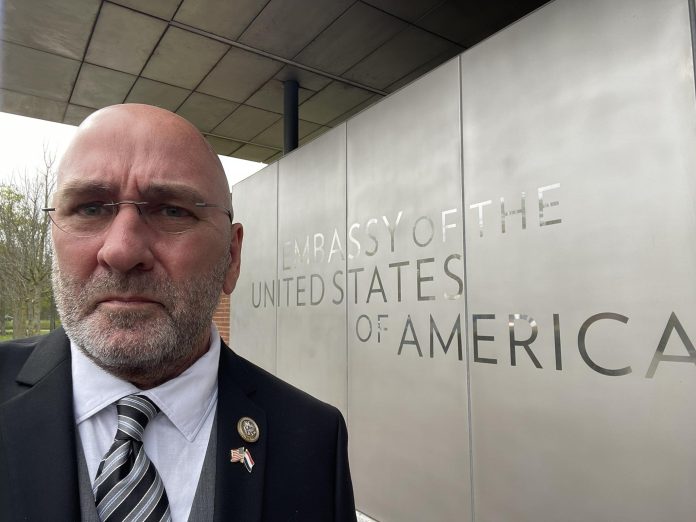Introduction
The recent vote in the United States House of Representatives on the Epstein Files Transparency Act has drawn significant public attention due to its unusual outcome. The bill, which seeks to facilitate the public release of documents related to investigations surrounding Jeffrey Epstein, received near unanimous support. Only one member of Congress voted against it. Representative Clay Higgins cast the single opposing vote, prompting interest in his position and the broader implications of the legislation.
Understanding this moment requires a clear look at the purpose of the Epstein files, the intent of the transparency bill, and the reasoning behind Higgins’s decision. This article provides a structured and factual explanation of each element, offering clarity on the discussion surrounding the vote and the issues connected to it.
Also Read: OpenAI chooses AMD for a six gigawatt GPU build beginning with MI450 in 2026
Who Is Clay Higgins
Clay Higgins is a United States Representative from Louisiana. He is known for his law enforcement background, his outspoken personality, and his strong conservative views. Before joining Congress, he spent years in policing and became famous for his tough on crime public messaging.
His unique style attracts attention, and he is often seen as someone who votes based on personal conviction rather than party pressure. This helps explain why he was willing to cast the only no vote on a bill that nearly every other member of Congress supported.
Clay Higgins is part of the Republican Party and represents Louisiana’s 3rd congressional district. He often emphasizes law, order, protection of citizens, and constitutional rights. This background plays an important role in understanding his vote on the Epstein files.
What Are the Epstein Files
The term “Epstein files” refers to a substantial collection of documents linked to the investigation and prosecution of convicted sex offender Jeffrey Epstein. These documents encompass investigative records, correspondence, flight logs, transcripts, and agency reports. After years of public demand for transparency, the Epstein Files Transparency Act was introduced with the intent to mandate the release of unclassified materials connected to the Epstein case.
Public interest in the files is rooted in the gravity of the allegations, the involvement of high profile figures, and ongoing questions about accountability and secrecy. Major news outlets such as the BBC and CBS News have reported on the public’s demand for disclosure and the legislative response.
The House Vote That Sparked Public Curiosity
In a rare instance of near-unanimous agreement, the U.S. House approved the transparency legislation by a margin of 427 votes to one. Clay Higgins cast the only vote in opposition. This single dissent drew significant attention because such strong consensus is uncommon in congressional voting.
Higgins’s decision to vote ‘no’ triggered questions about his motivations, particularly since the bill aligned with broad public sentiment. Analysts noted that voters and the press were keen to understand the reasoning behind the lone dissenting voice.
5. Why Clay Higgins Voted No
Clay Higgins later explained why he voted against the bill, and this is the part that most people want to understand. According to his public statements after the vote, his concerns were centered around protecting due process and the privacy of individuals who might be named but never charged with a crime.
His argument was simple and based on key points:
1. Risk of exposing innocent individuals.
He stated that some names in the documents may belong to people who had no criminal involvement. Releasing those names could harm reputations and lead to false accusations.
2. Concerns about incomplete investigations.
He raised the issue that some parts of the Epstein network may still be under investigation. Releasing files too early could interfere with or compromise legal processes.
3. Protection of victims.
Some victim identities could be unintentionally exposed depending on how information is released.
4. Need for more precise legislation.
He suggested that the bill should be reviewed again with clearer redaction rules and stronger protections.
What Higgins Said After the Vote
After the vote, Clay Higgins released a statement where he said that transparency is important, but the release of sensitive documents must be done carefully. He emphasized that the intention of the bill is good, but it might create unintended harm if not properly managed.
He also said he would support a revised version that better protects citizens while still promoting transparency.
Public Reaction
The singularity of Higgins’s vote prompted a surge of public interest and media coverage. Because nearly every member of Congress voted in favor, Higgins’s dissent stood out and sparked discussion about why he diverged. People sought to understand both the legislation and the man behind the decision.
The broader storyline connects to public sentiment around accountability, justice, and government transparency. Debates about the release of the Epstein files tap into long-standing concerns about secrecy and fairness in high profile investigations. The increased attention to Higgins stems from the intersection of those themes.
What Happens Next With the Epstein Files
The bill still needs approval from the United States Senate. If the Senate passes it, the next step will be the President’s approval. If everything goes smoothly, agencies like the Department of Justice will begin preparing files for release.
Even after that, many documents may:
-
Require redaction
-
Be delayed for legal reasons
-
Be withheld due to national security
So while the House vote is historic, it does not guarantee the immediate release of all Epstein files.
Final Thoughts
Clay Higgins became the center of a national conversation because he voted against something that almost every other member of Congress supported. The Clay Higgins Epstein Files trend highlights how curious people are about transparency, justice, and the Epstein investigation.
Whether you agree with his vote or not, understanding his reasoning brings clarity to a conversation that is filled with emotion and public interest. This story teaches us the importance of transparency, the need for careful handling of sensitive information, and the way single decisions can spark massive public curiosity.
External Sources for Further Reading
Here are helpful pages for additional insights:
-
CBS News coverage: https://www.cbsnews.com
-
BBC updates and analysis: https://www.bbc.com
-
People Magazine report: https://people.com
-
Congress official records: https://www.congress.gov










